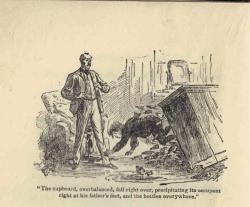
Classics in Short No.141: Seven Little Australians
Brian Alderson on Ethel Turner’s Seven Little Australians and how they brought Australia into the world of children’s fiction.
Up in a garret
down Concord way round about 1863 Jo March was to be found eating apples and crying over The Heir of Redcliffe. Such is the persistence of that Victorian classic that, thirty years later, in 1894, Meg Woolcott also has it among her ‘simple and wholesome fare’ in far distant Sydney – where it shares a shelf with Little Women.
This Meg,
like she of the March girls, may be the eldest of the children of Ethel Turner’s story, but here there are seven of them with four girls intermingled with three boys, the youngest of whom at the start of things is a baby, known as the General. That designation was applied to him at first sight by his father, a Captain in the Australian military, and it’s almost the only instance of good humour from that gentleman in the whole book. For the Captain is no army chaplain doing good works among the troops, but a remote, controlling presence, given to exercising discipline with strap, or riding-whip, or whatever comes to hand among his misbehaving brood. He seems to have bewildered himself by fathering the first six children of the family (his first wife died in giving birth to the girl known as The Baby) but he has married again and the new stepmother, Esther, only a few years older than Meg, is a countervailing presence of loving kindness.
Not for nothing
is The River House where they all live generally known as Misrule for, far from being in awe of their irritable father, the children possess a wild independence, an ‘electric sparkle’, very different from their forbearing forebears in Concord. The Baby’s older brother, Bunty, is that interesting figure, a dislikeable child, whose lying ways and unwillingness to own up to misdemeanours make him something of an outcast and certainly victim of the more ferocious beatings at his father’s hand
(‘Oh—h—h—h! oh—o–! o—o—h! ah—h—h! ’twasn’t my fault; it’s all the others. Boo—hoo—hoo!’)
Of the four older children
it is thirteen year old Helen, who is singled out as the worst of the lot ‘probably because she was the cleverest’ – her sister, Nell, and brother, Pip, on each side, having not much more than supporting roles in events. She was generally known as Fizz or Judy (perhaps after Mr Punch’s wife, always popping and jerking herself about) and, despite Meg’s seniority, she becomes the chief focus in the story. This occurs following a prank when she and Pip have much embarrassed her father by, unbeknownst to him, dumping the General on him at the Barracks. The end result is that she is despatched to a boarding school seventy-seven miles off from which she duly runs away, ending up hiding in one of the outhouses of Misrule in hopes of being looked after in secret by her siblings.
To the connoisseurs
of family and school stories her subsequent discovery and the consumption brought on by her flight from school should presage a death-bed scene, but one that, in that crowd, would hardly be comparable to Beth’s quiet passing among the little women. We are saved the moment though in favour of a mass shipment of the children (minus the Captain) on a recuperative visit to their stepmother’s family home three hundred miles away in sheep country round Yarrahappini ‘on the borders of the never-Never Land’. And it is among the hospitable freedoms there that fate catches up with her and the author has her killed by a falling blue-gum tree from which she has gallantly shielded the baby General.
The exoticism of location
and of life-style lends colour to this first Australian classic just as does the liveliness of its participants. At the same time, as with its American model, there are touches of the adult life that will await childhood’s end. At one point Meg is misled by a schoolfriend into a flirtatious connection from which she is saved by a more mature boy and later, up in the sheep country, she encounters Mr Gillet, an English book-keeper struggling with his own demons, who begs a blue ribbon from her but also falls victim to a prim adolescent homily.
Both of these touches
would remain to be found again in the sequel to the story whose success generated an immediate sequel, The Family at Misrule (1895). This takes place three years after its predecessor, when a new baby has brought up the numbers to seven again. There is a similar patterning with Bunty on the run after being wrongly accused of stealing money and ending up on the streets of Sydney (although they think he’s taken ship to England); and Pip trying to make a foolish liaison with a shopkeeper’s daughter. A prolonged scare over the coming of scarlet fever among the family brings the reader to fear more deaths but in the end we have to sacrifice Mr Gillet, a late arrival on the scene, dying in a fire in order to save his treasured blue ribbon.
It may look like a universal convention, but it brought Australia into the world of children’s fiction.
Brian Alderson is founder of the Children’s Books History Society and a former Children’s Books Editor for The Times. His latest book The 100 Best Children’s Books, Galileo Publishing, 978-1903385982, £14.99 hbk, is out now.
Editions of Seven Little Australians are available from Amazon.





